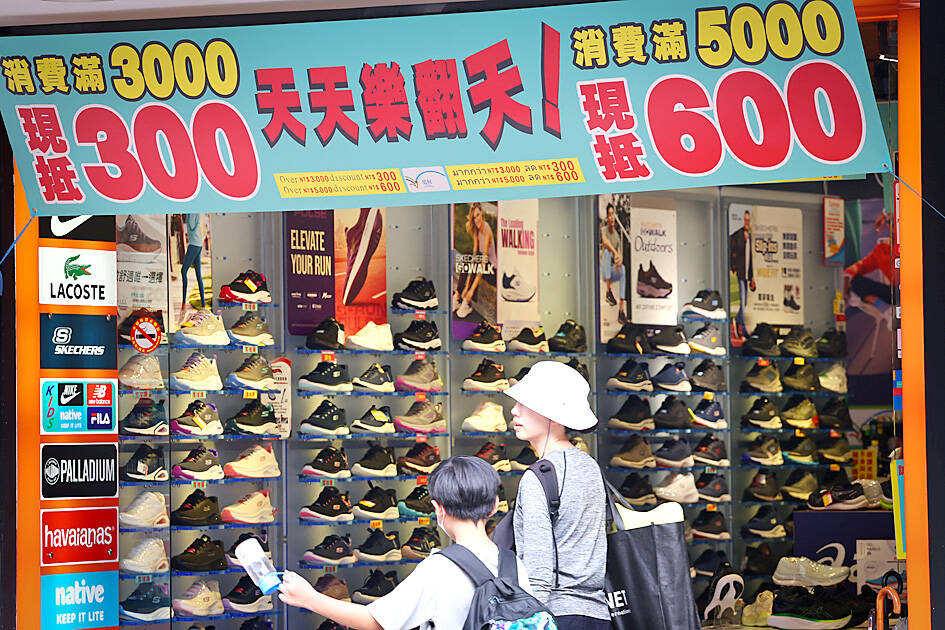Sales by the retail and food and beverage sectors last month continued their upward trend, reaching the highest May levels on record, while sales in the wholesale sector fell for a seventh straight month on an annual basis, the Ministry of Economic Affairs said yesterday.
Retail sales totaled NT$376.3 billion (US$12.13 billion) last month, an annual increase of 16.6 percent, while food and beverage sales reached NT$82.9 billion, up 44 percent year-on-year, the report said.
Last month’s increases in retail, and food and beverage sales were the fastest since July last year, when sales rose 18.1 percent and 78.3 percent respectively, ministry data showed.

Photo: CNA
The increase in retail sales was mainly driven by department store sales, which soared 56.5 percent from a year earlier, as well as sales in the apparel sector, which advanced 46 percent, while sales of vehicles, motorbikes and related components rose 37.2 percent.
Other growth drivers were household appliances, whose sales rose 17.7 percent from a year earlier, and food, beverage and tobacco products, whose sales gained 7.9 percent, the report said.
As for the food and beverage sector, the ministry said that catering service providers reported an 80.7 percent annual increase in sales, due to steady demand for in-flight meals, as air travel continued to recover.
In addition, restaurant sales rose 45.9 percent year-on-year, thanks to the effects of Mothers’ Day celebrations and a relatively lower comparison base last year, while beverage sales increased 22.6 percent on the back of new product launches and stronger demand for cold drinks amid rising temperatures, it added.
In the first five months of this year, retail sales rose 8 percent from a year earlier to NT$1.85 trillion, the highest for the period on record, while food and beverage sales also increased 24.5 percent over the period to a record NT$419.8 billion, ministry data showed.
Performance of the wholesale sector remained weak last month, as lackluster global demand and monetary tightening by central banks caused firms to continue inventory destocking, which led to low demand for machinery equipment, building materials and chemicals, the ministry said.
Overall sales dropped 12.9 percent from a year earlier to NT$945.7 billion last month, it said.
For the first five months of this year, wholesale revenue fell 12.5 percent from a year earlier to NT$4.64 trillion, it said.
For this month, the ministry forecast that retail and food and beverage sales would grow on the back of the holiday effect, with more people willing to spend during the graduation season and summer break, as well as promotional campaigns launched by auto dealers.
However, sales in the wholesale sector would likely stay in negative territory this month, as macroeconomic uncertainty remains and firms are still digesting inventory, the ministry added.

Taiwan Semiconductor Manufacturing Co (TSMC, 台積電) would not produce its most advanced technologies in the US next year, Minister of Economic Affairs J.W. Kuo (郭智輝) said yesterday. Kuo made the comment during an appearance at the legislature, hours after the chipmaker announced that it would invest an additional US$100 billion to expand its manufacturing operations in the US. Asked by Taiwan People’s Party Legislator-at-large Chang Chi-kai (張啟楷) if TSMC would allow its most advanced technologies, the yet-to-be-released 2-nanometer and 1.6-nanometer processes, to go to the US in the near term, Kuo denied it. TSMC recently opened its first US factory, which produces 4-nanometer

PROTECTION: The investigation, which takes aim at exporters such as Canada, Germany and Brazil, came days after Trump unveiled tariff hikes on steel and aluminum products US President Donald Trump on Saturday ordered a probe into potential tariffs on lumber imports — a move threatening to stoke trade tensions — while also pushing for a domestic supply boost. Trump signed an executive order instructing US Secretary of Commerce Howard Lutnick to begin an investigation “to determine the effects on the national security of imports of timber, lumber and their derivative products.” The study might result in new tariffs being imposed, which would pile on top of existing levies. The investigation takes aim at exporters like Canada, Germany and Brazil, with White House officials earlier accusing these economies of

Teleperformance SE, the largest call-center operator in the world, is rolling out an artificial intelligence (AI) system that softens English-speaking Indian workers’ accents in real time in a move the company claims would make them more understandable. The technology, called accent translation, coupled with background noise cancelation, is being deployed in call centers in India, where workers provide customer support to some of Teleperformance’s international clients. The company provides outsourced customer support and content moderation to global companies including Apple Inc, ByteDance Ltd’s (字節跳動) TikTok and Samsung Electronics Co Ltd. “When you have an Indian agent on the line, sometimes it’s hard

PROBE CONTINUES: Those accused falsely represented that the chips would not be transferred to a person other than the authorized end users, court papers said Singapore charged three men with fraud in a case local media have linked to the movement of Nvidia’s advanced chips from the city-state to Chinese artificial intelligence (AI) firm DeepSeek (深度求索). The US is investigating if DeepSeek, the Chinese company whose AI model’s performance rocked the tech world in January, has been using US chips that are not allowed to be shipped to China, Reuters reported earlier. The Singapore case is part of a broader police investigation of 22 individuals and companies suspected of false representation, amid concerns that organized AI chip smuggling to China has been tracked out of nations such